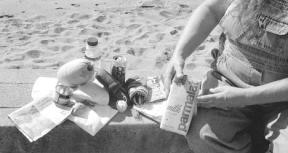Keeping Island County’s beaches clean is no small task.
With more than 500 miles of public beach access, maintaining the pristine beauty of Whidbey’s shorelines is helped by a grant from the Washington Department of Ecology.
Island County will share in more than $892,000 in state grants with six other counties and the cities of Seattle and Everett.
The Community Litter Cleanup Program, administered by the Department of Ecology, provides funding to local governments that have approved plans to clean up litter and illegal dumps and to provide anti-litter education in their communities. The funding is for two years.
While most other recipients target roadsides and public land, Island County will use most of its $62,000 to clean up the beaches.
“We were chosen to receive this grant in part because of our strong volunteer base. Most other counties and cities use correction inmates to pick up litter,” said Janet Hall of the WSU Extension office in Coupeville.
According to Hall, director of the WSU Waste Wise program, “We target the beaches because there are a number of groups who volunteer to work on sections of the state highway and county roads.”
Cheryl May, coordinator for Island Beach Cleanup, leads volunteer groups in beach clean ups and encourages private beach communities to set up their own program. May will pick up the trash collected for disposal.
“Our purpose is to pick up anything that doesn’t belong naturally on the beach,” May said.
“Education is where it all begins. That’s why the volunteer beach clean ups and programs in school are so important to raise the awareness of the negative impact litter has on wildlife,” May said.
Most of the litter washes onshore and ranges from huge hunks of styrofoam to strands of frayed plastic rope and net to aluminum cans and diapers.
May has seen it all and most of it is harmful to both marine and bird life.
“It’s unsightly, too,” May said.
San Juan County also received part of the grant — $47,590 — to operate litter pickup crews of both juvenile and adult offenders and youth volunteers.
The grant is funded from taxes on industries — food, tobacco, soft drinks wine, beer, glass containers, metal containers, newspapers, magazines, cleaning agents and toiletries — whose products can contribute to the litter problem.
The tax rate, which has not changed since it was originally passed, is relatively small at .015 percent, which equates to $150 per $1 million of gross proceeds. In the late 1990s the tax generated between $5 and $7 million per year.
For information about beach cleanup events, contact Cheryl May at 360-678-4100 or e-mail cmay@whidbey.net.



